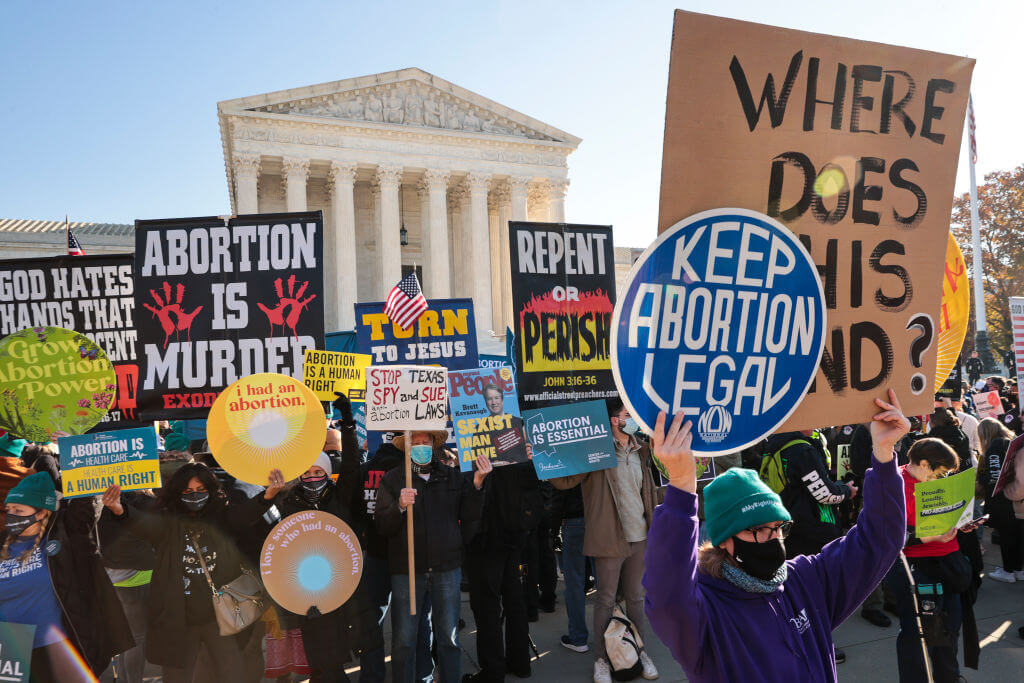The leaked Roe v. Wade decision is a win for religious fervor
The anti-abortion views are rooted in a specific Christian belief that life begins at conception and that abortion, therefore, is murder. Jews don’t believe that.

Demonstrators gather in December 2021 in front of the U.S. Supreme Court. Photo by Getty Images
The leaked Supreme Court decision reversing Roe v. Wade reverses something almost as consequential as a woman’s right to choose: a belief that rights, once won, are ours to keep.
The past several years have been an ongoing lesson in loss, if not a Dark Ages — a time when curtains that had been flung open to the light seem to be closing shut again.
Roe v. Wade, we thought, was “settled law.” But, according to a copy of a Supreme Court draft decision that Politico published Monday night, the Court stands ready to overturn its landmark 1973 decision asserting the Constitutional protection of a pregnant woman’s right to choose to have an abortion without undue government restriction.
Abortion is common: about 1 in 4 American women have them at some point under the current legal landscape. But if the court indeed overturns Roe, 26 states would basically ban abortion, according to the Guttmacher Institute. Women in these states, and in others expected to pass laws making abortion more difficult to obtain if not illegal, would face a situation familiar to generations of women pre-Roe: finding ways around the law that could lead to serious health compliations.
That means women who are able would flock to states where abortion remains legal and accessible – California, for one, is imagined to see a 3000% increase in the number of women seeking services.
But there would be thousands of women unable to afford the time or expense of travel, the majority of them poor, young and women of color. Sheila Katz, CEO of the National Council of Jewish Women, last year called abortion “a racial justice issue,” saying “our Jewish values compel us” to ensure access to it.
Those women would be the victims of a battle that too many of us believed was won for good. They made a TV movie about it back in 1989, right? “Roe v. Wade is going to the Supreme Court!” a righteous Holly Hunter declares triumphantly in the film.
That triumph satisfied the majority of Americans who believe abortion should be safe and legal — since 1989, between 52% and 66% of Americans say they want Roe upheld.
But the victory invigorated an opposition, rooted in the Christian Right – evangelicals allied conservative Catholics – who engaged in a long, focused battle to overturn Roe.
One side took victory as a given, another as a goal. Their battle plan was broad: electing local officials who would pass more restrictive laws as well as pushing Supreme Court nominees who would, despite saying that Roe was “settled law,” sign on to a decision eviscerating it.
They even made their own “Roe v. Wade” movie in 2019. It depicts anti-abortion activists behind an “anti-Catholic conspiracy,” as The New York Times put it, “in cahoots, we’re told, with Hollywood, the news media, Protestant clergy and rabbis, with the latter singled out in a caricaturish scene.”
The religious overtones should surprise no one, because the struggle over reproductive rights in America has always been about the blurry lines between church and state.
The anti-abortion views are rooted in a specific Christian belief that life begins at conception and that abortion, therefore, is murder. Jews don’t believe that.
“In Jewish tradition, the pregnant person’s needs are central to the moral equation,” wrote Sarah Seltzer, an editor at the Jewish feminist journal Lilith.
The state of Israel, which so many evangelical Christians support unreservedly, has had legalized abortion since 1977.
“Striking down the legality or government funding of abortions is not a cause of any political party, not even the most right wing,” journalist Yardena Schwartz wrote earlier this year. “Why? Because life and the protection of it are sacred in Judaism, and when the physical or mental health of a woman is threatened by an unwanted pregnancy, it is the right thing to do to allow her to end that pregnancy.”
Though Jews are a tiny minority in the United States, that statement more closely aligns with what a majority of Americans believe. Unfortunately, not with abortion’s vociferus religious foes and the politicians who do their bidding.
It seemed Roe, by enshrining the right of citizens to decide how to handle pregnancy based on their own faith and conscience, put an end to the fight. But it didn’t — it just let one side think the fight was won.
And if there’s a lesson to be learned from Monday’s leaked draft, it’s that fights like this are never really won.
When Barack Obama was elected president in 2008, a solid majority of Americans believed that progress in race relations was “inevitable.” We now know that struggle is far from over.
There are school boards and libraries across America banning books and the teaching of accepted facts of American history. There is a rise in white nationalism and, as the last of the generation of Holocaust survivors dies, more recorded incidents of antisemitism.
Starting Monday night in front of the Supreme Court, abortion-rights activists took to the streets to protest the forthcoming ruling. They will undoubtedly be joined by large demonstrations across the country in the coming days.
The lesson is learned, and probably has to be forever relearned: Take no freedom for granted.






















